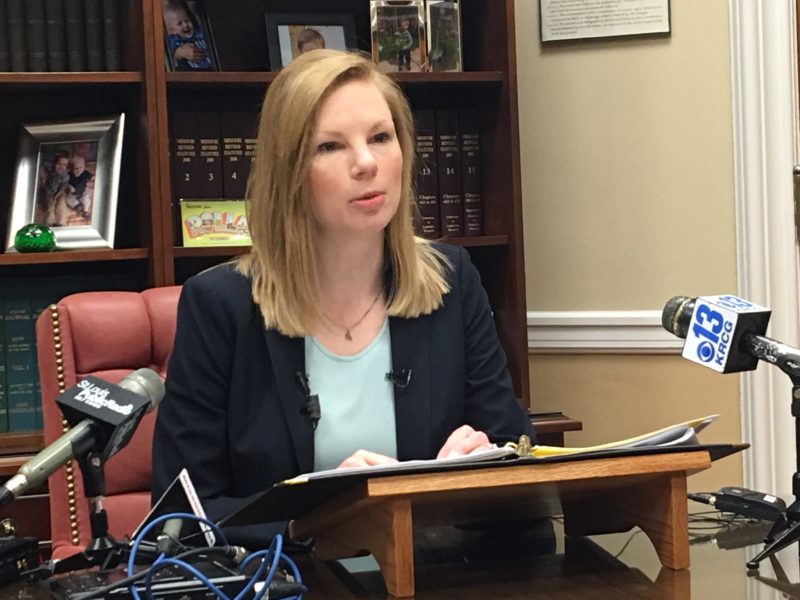JEFFERSON CITY, Mo. – Missouri State Auditor Nicole Galloway says the latest audit released by her office is personally troubling.
On Monday, Galloway’s office released a scathing report detailing how the University of Missouri System hid more than $2 million in “bonus” pay. The audit also revealed what Galloway called irresponsible management in the UM System’s handling of MU Chancellor R. Bowen Loftin’s resignation in Nov. 2015.
“For me, this is personal,” Galloway said. “I went to Rolla, I have my MBA from Mizzou, and I live in Columbia. I’ve paid my tuition checks to the university, so I found this personally troubling.”
Galloway cited a lack of transparency when it comes to the matter of executive pay, as the audit showed “inappropriate bonus payments to top executives”, including incentive payments, luxury vehicle allowances and other forms of compensation that were not included in their published salaries.
The audit details how $2.3 million was paid to the top administrators, including $1.2 million in incentives award to 18 executives and administrators over a three-year period. Galloway said no formalized, clearly defined process or specific criteria defined how incentives are earned, but rather says the payments appear as year-end bonuses, which is a violation of the Missouri Constitution. In the Missouri Constitution, a state employee cannot receive compensation for work already performed.
“System administrators might argue that these payments are acceptable because they are incentives,” Galloway said. “But I don’t care what loophole is used. These payments must be included and public compensation figures released to taxpayers so they know how their money is being spent.”
The majority of these payments, including $60,000 in retention bonuses, were paid without formal approval by the Board of Curators for each individual amount.
Galloway said that the UM System paid an excessive amount in vehicle allowances, approximately $407,000 for 18 executives and administrators in 2015 and 2016 to be used for the leasing of a luxury vehicle, insurance, and fuel. Galloway said that the amount of money provided for fuel costs could be cut down considerably if they would reimburse for mileage rather than providing a stipend to cover the costs.
The audit also uncovered more than $800,000 in undisclosed retention bonuses, relocation payments and housing allowances.
Perhaps even more alarming than the hidden bonus expenditures is the financial management of the resignation process for former University of Missouri Chancellor R. Bowen Loftin.
Following the events of November 2015, including the hunger strike by Jonathan Butler, the football team’s strike and the protests of ConcernedStudent1950 receiving national media coverage, Loftin resigned Nov. 9, 2015 alongside then UM President Tim Wolfe.
As chancellor, Loftin had been receiving an annual salary of $459,000. The audit revealed that Loftin continued to receive that salary, taking in $230,000 over a six-month period following his resignation, even though he had no official duties and was not officially employed by the university in any capacity.
“He continued to receive his six-figure salary long after resigning from his position while providing no measurable services to the university,” Galloway said.
In June 2016, Interim Chancellor Hank Foley approved a new contract for Loftin for the newly-created position of Director of National Security Research Development, which came with an annual salary of $344,000. That salary is significantly higher than other research administrators within the university and Loftin’s own supervisors.
The audit revealed that under the terms of this new contract, Loftin was allowed to keep additional compensation, including a $100,000 retention bonus, an annual $15,600 luxury car allowance, and a $35,000 annual stipend with no restrictions on its usage.
It also revealed that Loftin was granted “developmental leave” to spend the remainder of 2016 traveling with no clear objectives, all while receiving his salary and an additional $50,000 travel budget. Galloway said it was unclear how Loftin should receive these benefits included in the contract or how it was decided to give Loftin a half million dollars over the course of one year with no work responsibilities or product to show.
“In their responses, the system repeatedly stressed that they did not break the law, but in my opinion, that is a poor standard by which they expect their conduct to be measured, by this office and the public,” Galloway said. “That’s a low bar when it comes to spending our tax dollars and tuition checks. These actions show a complete lack of awareness from a group of administrators who have forgotten who they serve. System leaders must work to accept responsibility for their action and regain the public’s confidence instead of listing off excuses.”
In a release issued Monday morning, the University of Missouri System President addressed some of the audit results.
“The UM System strives to be more accountable and transparent in its stewardship of public resources,” President Mun Choi said. “We will use the audit report to continue improving our business processes and our operations.”
The audit results come less than a week after Gov. Eric Greitens announced that he would like universities to keep student tuition low, saying he expected the universities to make cuts to underperforming and unnecessary programs to make up for less state funding.
Greitens issued a statement regarding the results of the audit Monday evening.
“Here’s the deal: Top University of Missouri leaders (anyone with dean, president, chancellor, provost, director, chief, and chair in their job titles) already get more than $62 million in combined annual salary. Salaries of those upper-level leaders jumped $4 million between 2015 and 2016. So when they say that students should have to pay more, I don’t buy it.”
In the statement, he said that he would be meeting with the heads of several major universities across the state on Tuesday to “deliver a clear message.” That message will be that:
- Colleges and universities are important to our state’s future.
- We need to cut waste from that system, just like every other area of government.
- We want excellence in our colleges and universities, and we’re willing to invest in it.
- We won’t balance budgets on the backs of our students.
Galloway also said that a follow-up audit is planned to begin at the end of the current fiscal year.
Benjamin Peters was a reporter for The Missouri Times and Missouri Times Magazine and also produced the #MoLeg Podcast. He joined The Missouri Times in 2016 after working as a sports editor and TV news producer in mid-Missouri. Benjamin is a graduate of Missouri State University in Springfield.










